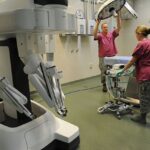How does AI Work in Medicine?
Artificial Intelligence (AI) is the ability of machines to perform tasks that typically require human intelligence, such as learning, reasoning, problem-solving, and decision-making.
- AI analyzes large amounts of medical data, such as patient records or research studies, to find patterns.
- AI relies on machine learning, where it “learns” from the data it processes and becomes more accurate with continuous use.
Imaging: AI systems are trained to detect signs of diseases like cancer by analyzing X-rays, MRIs, or CT scans, often spotting details invisible to the human eye.
Prediction: AI predicts disease outbreaks or patient risks by analyzing data trends.
Applications of AI in Healthcare
AI is revolutionizing how we diagnose, treat, and prevent diseases.
Diagnosis: AI tools like IBM Watson assist doctors by suggesting potential diagnoses.
Treatment: By tailoring treatments based on patient data, personalized medicine is possible through AI.
Predictive Healthcare: AI identifies risks by analyzing genetic information and lifestyle habits.
Surgery: Robots like da Vinci are controlled by surgeons for precise, minimally invasive operations.
Drug Discovery: AI speeds up the process of developing new medicines by analyzing compounds and predicting their effectiveness in treating diseases.
Fun Facts
Here are some interesting facts about AI in medicine:
- AI-powered mental health tools like Woebot and Wysa provide emotional support and therapy to those in need.
- MYCIN, developed in the 1970s, was one of the first AI systems to diagnose bacterial infections.
- In the 1990s, the ARM (Augmented Reality for Medicine) system helped doctors perform minimally invasive surgeries with robotic precision.
- A robot in China, equipped with vast medical knowledge, passed the medical license exam faster and more accurately than humans, scoring 456 out of 500.
Review
Let’s quickly recap what we learned about AI in medicine:
- What does AI analyze to find patterns in medicine? Data
- What process allows AI to improve accuracy over time? Machine Learning
- Which AI tool helps doctors suggest potential diagnoses? IBM Watson
- Which medical imaging technique does AI use to detect diseases like cancer? X-Rays, MRIs, & CT Scans


Recent Comments